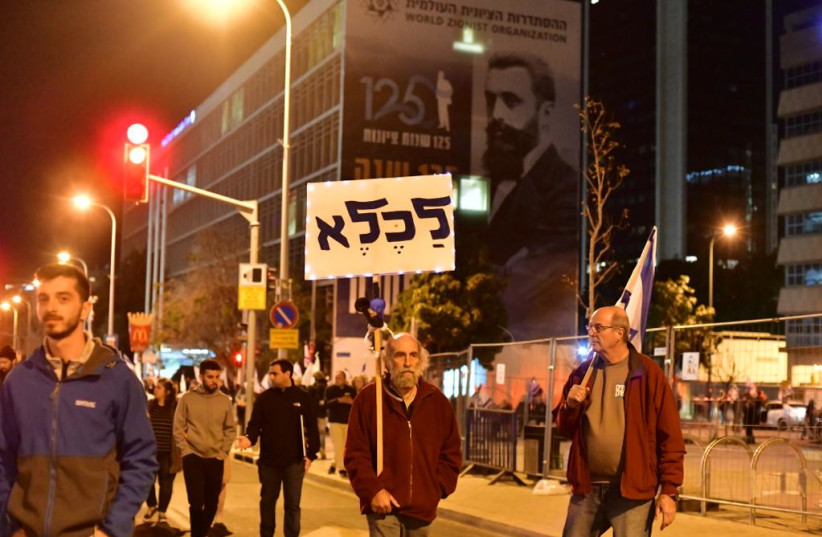Ahead of judicial reform bills being placed before the Knesset plenum on Monday, protesters marched in Tel Aviv and other cities across Israel on Saturday night in the seventh consecutive weekend of demonstrations since the reforms were proposed.
According to organizers, almost a quarter million Israeli joined the demonstrations across over 60 sites in Israel, including the almost 135,000 people in Tel Aviv who marched from Dizengoff Center to Kaplan Street.
The Yesh Atid party said that its activists had accompanied protesters at 40 different locations across the country. 18,000 people were reported to be rallying in Haifa, and 22,000 in Kfar Saba, where former justice minister Tzipi Livni and State Camp MK Benny Gantz spoke, respectively.
Opposition leader Yair Lapid spoke in Netanya to a crowd of at least 8,000 people.
"There is one difference between a dictatorship and a democracy. In a dictatorship the government is allowed to do what it wants, in a democracy, the citizens have rights that the government is forbidden from touching," said Lapid. "Just because they have a majority in the Knesset doesn't mean they can ban women from leaving the house, it doesn't mean they can decide that we have to pay their voters' bills, and it doesn't mean they can wipe out the High Court [of Justice] just because the prime minister has indictments and his deputy is convicted felon."

Lapid said that the government didn't expect such a degree of protests, and for the demonstrations to only continued a week or two. The opposition leader said that he had been to many protests, but the marches in the last few weeks were different.
Previous rallies had been marred by statements that pro-reformists alleged veered into incitement to violence.
Police commissioner makes rare TV appearance
Police commissioner Kobi Shabtai made a rare TV appearance on N12 Saturday night, expressing concern about political assassinations, and that authorities were taking precautions.
"The current situation makes me sleepless, we are on a steep slope," Shabtai told N12. "This is the opportunity to tell everyone to take a breath, relax and get into the bush. Israel has already experienced harm to elected officials and we see similar threats online."
Shabtai decided to establish a special unit against incitement to violence, Israel Police also said in a statement on Saturday night.
"The Israel Police will not allow violent discourse or any publication that incites violence and harm to public figures or any person," said Shabtai. "Let every person know that his choice of words can lead to violence against public figures, leaders of public opinion and ordinary citizens."
Likud files a complaint
On Friday, the Likud announced that it had filed a complaint with the police against former prime minister Ehud Barak, and left-wing activists over alleged calls to incitement and for civil disobedience.
"There is no room for incitement among us and we have to condemn it and do everything to stop it," Prime Minister Benjamin Netanyahu wrote on his Facebook page.
On Thursday and Saturday, when protesters commandeered a tank and armored personnel carrier from memorial sites to be used as props by anti-reform veterans groups. This was not only decried by other veterans but pro-reform groups who said that such actions were connected to violent rhetoric used by protest leaders.
On Friday, organizers of the protests warned that "The State of Israel is one step away from becoming a dictatorial state and the only remaining counter is the mass of men and women taking to the streets."
The marches come just two days before judicial reform bills reach the Knesset plenum on Monday. The bills preventing the High Court from engaging in judicial review on matters pertaining to Israel's quasi-constitutional Basic Laws and changing the composition of the judge selection committee
The Constitution, Law and Justice Committee was set to hold four sessions this week on another bill to restrict the High Court from using judicial review only with a full bench in unanimous agreement, and to introduce a simple Knesset majority override clause to overrule the court on the striking of laws.
Following President Isaac Herzog's Sunday five-point proposal for negotiations on the reforms, reform critics have called on Levin and law committee chairman MK Simcha Rothman to cease the legislative process as a precondition for talks.
"I join the call to stop the hasty legislative process, and to walk the path of dialogue in the spirit of the president's outline," Former Shin Bet chief Yoram Cohen said at a rally of at least 10,000 in Jerusalem. "I also think there is room for changes and improvements in the judicial system. But it seems that the purpose of the proposed legal reform is not to improve the legal system, but to neutralize it."
At a Movement for Quality Government in Israel conference on Friday, State Camp MK Orit Farkash-Hacohen called the coalition to "stop the legislation, a complete freeze. Now."
Farkash-Hacohen asserted that while Rothman and other reform leaders had expressed willingness to negotiate, this was "spin."
"Yesterday, an interview was published in which Rothman said that he would not agree to an override clause of more than 61, is this a negotiation?" said Farkash-Hacohen. "On Sunday he is convening the Constitution Committee to continue promoting the plan, is this a freeze? Is this a stop? Is this a conversation? Are we supposed to have a conversation from Thursday to Sunday? On Monday he passes the legislation on first reading and not a minute later, is that a freeze? Is this the president's outline?"
Levin told Channel 13 on Saturday night that the coalition would not cease the legislative process.
"I am ready to meet Lapid and Gantz tonight. I think it is necessary to sit down to talk. What kind of thing is it to set conditions in order to talk?" Levin told Channel 13. "We will not return to a situation where judges have veto power in the committee for selecting judges."
